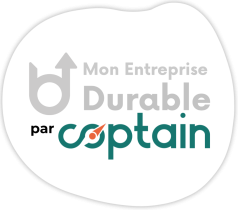Before you start reading
At Mon Entreprise Durable, we support CSR managers in their critical moments: awareness and commitment, audit and action plan, the implementation of 5 actions and certifications.

Key points of the article
By now, you know that obtaining the EcoVadis Medal is like having a sesame that opens up new business opportunities. In BtoC, consumers value Corporate Social Responsibility (CSR) actions. In BtoB, your customers may be required to prove their commitment to CSR, and therefore your own results in terms of sustainable development. Hence the importance of aiming for an excellent EcoVadis score.
This world-class certification is distinguished by its focus on the value chain: suppliers. As a result, it has become a must-have for boosting your competitiveness and opening doors to new markets and partnerships. Obtaining it is more than just a formality or a badge to proudly display on your website. It’s much more than that: it’s a tangible recognition of your company’s commitment to CSR, which your customers will in turn be able to value.
But how do you make sure you get that coveted bronze, silver, gold or platinum medal? Here are five best practices for understanding and improving your EcoVadis score.
1. Understanding EcoVadis evaluation criteria
If you’re still wondering “What is EcoVadis?” or “How is the EcoVadis assessment carried out?then a quick recap is in order.
EcoVadis is a platform for assessing CSR performanceperformance evaluation platform, which rates companies on four main themes: environmental, social, ethical and responsible purchasing. These criteria are in turn subdivided into 21 indicators, providing a global and detailed view of each company’s responsible practices. They are modulated according to each organization’s size, business sector and location. Your final score is a weighted average, and depending on your score, you could win one of the famous EcoVadis medals.
| Medal level | Percentile rank | Overall score (indicative)* |
|---|---|---|
| Platinum | Top 1% of | 78 à 100 |
| Gold | Top 5 | 70 à 77 |
| Silver | Top 25 | 59 à 69 |
| Bronze | Top 50 | 50 à 58 |
* the overall score evolves according to the scores of the companies evaluated over the last 12 months. It tends to increase over the years.
Your first task is to understand these criteria and where you stand in relation to them. A careful reading of the EcoVadis questionnaire and evaluation documents is a good place to start. Ask yourself the right questions:
- Where does your company stand in terms of environmental management and waste recycling?
- What policies have you put in place regarding equal opportunities and working conditions?
- Are you transparent about your supply chain?
Understanding these elements will help you prepare for the next step: improving your score. Because the EcoVadis assessment is not a bureaucratic exercise; it’s a true mirror of your social and environmental performance. You’ll be able to identify the areas in which you excel and those in which you need to improve. A real godsend, saving you precious time!
Source : https://ecovadis.com/
2. Implement solid, measurable CSR policies
Set a course for the top of the podium, focus on strengthening your CSR policies. These must be solid, i.e. well-defined, applicable and measurable. This last point is important to remember: EcoVadis analysts won’t just read your documents, they’ll want to see the real impact of your actions. That’s why you need to link each document to concrete, quantifiable and, ideally, third-party verifiable results.
A common mistake is to write general policies that lack precision. Instead, define clear objectives, both qualitative and quantitative. For example, if you commit to reducing CO₂ emissions, define a percentage reduction over a given period and track your progress with performance indicators (KPIs).
Another mistake companies make is underestimating the importance of documentation in the EcoVadis assessment. For each criterion assessed, you will be asked to provide tangible evidence: internal policies, audit reports, certificates, etc. These documents must be authentic, reflect practices in force for at least three months, and above all, be relevant. These documents must be authentic, reflect practices that have been in force for at least three months, and above all, be relevant.
Take the time to review your internal policies, sustainability reports, ethical charters and all other relevant documents. Make sure they are up to date, complete and aligned with international best practice. For example, if you have an environmental policy, does it comply with ISO 14001 standards? Are your ethical commitments clearly defined and backed up by concrete action?
Here are a few tips to help you prepare these documents efficiently:
- Centralize your information: create a shared folder where all relevant documents are stored. Make sure they’re up-to-date and easily accessible.
- Careful presentation: each document should mention your company’s name, logo, date of creation or revision, and a brief summary of actions taken.
- Highlight the results: the numbers speak for themselves. If you’ve managed to reduce your carbon footprint by 15% in two years, that’s the kind of information you absolutely must put forward.
Over 30 organizations have already placed their trust in us as they make the transition to sustainability. What if it were your turn? Take action and start your CSR process with us!
3. Involve the entire company in the CSR process
Whose responsibility is it to improve the EcoVadis score? Management, CSR managers? Yes, but not only. It’s a collective effort that needs to be supported by the whole company. To do this, train your teams.
Start by making your employees aware of CSR issues issues and the importance of EcoVadis certification. This can be done through training, workshops or regular internal communications. You can also appoint “CSR ambassadors” within each department to ensure that policies are understood and applied at all levels.
Involving your suppliers is just as important. Responsible purchasing accounts for 20% of your total score. You can easily put them in your bag by choosing business partners who respect the same CSR standards as you do. Working hand in hand with them to improve their own performance can have a direct impact on your rating.
4. Ongoing monitoring and evaluation of CSR actions
While your good intentions are commendable, they are not enough. Above all, you have to prove that you put them into practice, bearing in mind that measurable results count for 35% of your final score.
So what can you do? Use management and reporting systems to evaluate your CSR policies on an ongoing basis. Set up precise KPIs to monitor your performance and quantify the real impact of your actions.
For example, if you have implemented a policy to improve employee health and safety, regularly monitor accident rates or absenteeism. This monitoring should be documented and presented at your appraisal to show that your actions are having a tangible effect, as in this key performance indicator chart :
| CSR Area | Example of KPI | Period of validity |
|---|---|---|
| Environment | Reducing CO₂ emissions | 2 years old |
| Occupational health and safety | Work-related accident rate | 2 years |
| Responsible purchasing | Proportion of suppliers with CSR certification | 2 years |
Continually monitor these indicators to adjust your strategies in real time to stay on track.
5. Put yourself in the shoes of EcoVadis analysts
Put yourself in the shoes of the EcoVadis analysts who will evaluate your questionnaire and decide on your case. How? By carrying out your own self-assessment. Periodically, take a step back from your practices and identify your weak points before they are detected by others. Here are some questions to ask yourself during this self-assessment:
- CSR policy: is our CSR policy well documented and aligned with international standards such as ISO 26000?
- Actions: do we have concrete actions in place for each of the themes assessed (environment, social, ethics, responsible purchasing)?
- Results: can we prove the effectiveness of our actions with clear performance indicators and measurable results?
Use this self-assessment to make adjustments before submitting your official application. You’ll gain peace of mind and increase your chances of winning a high medal.
After each EcoVadis assessment, you’ll receive detailed feedback on your company’s strengths and areas for improvement. This feedback is a gold mine for understanding where you stand in relation to your peers, and what you can do to move forward. Take the time to analyze these results in depth. Identify the areas in which you can still make progress, and define new actions to continue improving your score.
Case study: ALD Automotive and its move to platinum
Take ALD Automotive, for example, a company that has managed to win a gold medal for four consecutive years and has now been awarded the EcoVadis Platinum Medal Platinum Award in 2023. How did they do it?
ALD Automotive has implemented a robust CSR strategy based on clear, measurable objectives, particularly in the environmental field. One of the highlights of their approach was the 10% improvement in the environment category, which was decisive in moving from gold to platinum. They were also able to involve the whole company in this process, which led to significant results in all the categories assessed. This effort paid off, enabling the Swiss company to climb into the top 1% of companies audited worldwide.
What’s particularly interesting about their approach is their ability to innovate and continually improve. Even after winning a gold medal, ALD’s managers didn’t relax their efforts; on the contrary, they sought to push back their limits. This case shows that the EcoVadis assessment is not an end in itself, but a continuous process of improvement.
To conclude...
Speaking of medals, let’s end with an Olympic reference. Improving your EcoVadis score is not a sprint, it’s a marathon. It’s hard work that requires commitment, rigor and a long-term vision. But it’s well worth the effort. By achieving a good score, you strengthen your credibility with your partners and customers, and at the same time contribute to a more sustainable future.
So don’t settle for a medal, aim for excellence. With the best practices we’ve covered here, you’ve got everything you need to pass your EcoVadis assessment with flying colors. It’s now up to you to take action and turn your CSR commitment into a competitive advantage.
Your goal is to obtain the EcoEntreprise certification ? Put your trust in a company that has gone through the same process. We can also assist you with B-corp, CSRD or Ecovadis.







